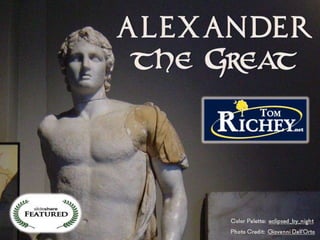
Alexander the Great
- 1. Alexander the Great: A Presentation by Tom Richey (TomRichey.net)
- 2. TERMS LIST: Philip II, Demosthenes, Orator, Philippic, Alexander the Great, Gordian Knot, Battle of Gaugamela, Hellenism, Seleucid Empire, Ptolemaic Empire
- 3. Macedonia was a second-rate power before Athens and Sparta weakened each other in the Peloponnesian War.
- 4. PHILIP II, king of Macedon and father of Alexander the Great, conquered the Greek city states.
- 5. The Macedonian Empire at the Death of Philip II. Note that Sparta remained unconquered by Philip.
- 6. Laconic: Concise or terse speech, named for the Spartan homeland, Laconia. The Spartans attempted to communicate ideas in as few words as possible (this was all part of the Spartan ideal of simplicity).
- 7. Philip sent a messenger to Sparta with a warning.
- 9. Demosthenes was an Athenian orator who delivered a series of philippics – passionate orations against Philip II aimed at encouraging the Athenians to resist. Athenian resistance ultimately failed, but Demosthenes is still remembered as a great orator and the term, philippic, is still used to describe an angry speech directed at an individual in power.
- 10. In order to unite the people of the Greek city- states he had conquered, Philip planned to go to war with the Persian Empire.
- 11. But Philip was assassinated before he could execute his plan.
- 12. Philip’s plan would be carried out by his son, Alexander.
- 13. Alexander the Great was King of Macedon from 336-323 B.C. Although he conquered the known world, he was also an adventurer and a cultural ambassador who would spread Greek culture across the East.
- 14. A map of Alexander the Great’s conquests.
- 16. The Battle of Granicus: Note alexander’s leadership from the front commanding his Companion Cavalry.
- 17. Alexander personally commanded his Companion Cavalry, placing himself in the thick of every battle. Alexander trained his horse, Bucephalus (Ox Head), after others had given up on him as unbreakable.
- 18. The Companions charged in a wedge formation in order to maximize power.
- 19. In 333 B.C., Alexander and his army wintered in Gordium, a city in Asia Minor. In Gordium, there was a knot that no one could untie. It had been prophesied that whoever could untie the knot would be the ruler of Asia. After trying unsuccessfully to untie the knot, Alexander drew his sword and cut it in half. Sometimes, the term, “Gordian knot,” is used to describe a seemingly complex problem that has a simple solution one someone thinks outside the box.
- 20. The Battle of Issus: Alexander was heavily outnumbered, but used the terrain to his advantage. He fought the Persian king, Darius, on a narrow battlefield that played to his strengths (think Thermopylae).
- 21. Alexander’s companions smashed through the Persian line, creating a gap at a critical point. This was Alexander’s second decisive victory over the Persians.
Editor's Notes
- Alexander the Great: A Presentation by Tom Richey (TomRichey.net)
- TERMS LIST: Philip II, Demosthenes, Orator, Philippic, Alexander the Great, Gordian Knot, Battle of Gaugamela, Hellenism, Seleucid Empire, Ptolemaic Empire
- Macedonia was a second-rate power before Athens and Sparta weakened each other in the Peloponnesian War.
- PHILIP II, king of Macedon and father of Alexander the Great, conquered the Greek city states.
- The Macedonian Empire at the Death of Philip II. Note that Sparta remained unconquered by Philip.
- Laconic: Concise or terse speech, named for the Spartan homeland, Laconia. The Spartans attempted to communicate ideas in as few words as possible (this was all part of the Spartan ideal of simplicity).
- Philip sent a messenger to Sparta with a warning.
- A Laconic Reply
- Demosthenes was an Athenian orator who delivered a series of philippics – passionate orations against Philip II aimed at encouraging the Athenians to resist. Athenian resistance ultimately failed, but Demosthenes is still remembered as a great orator and the term, philippic, is still used to describe an angry speech directed at an individual in power.
- In order to unite the people of the Greek city-states he had conquered, Philip planned to go to war with the Persian Empire.
- But Philip was assassinated before he could execute his plan.
- Philip’s plan would be carried out by his son, Alexander.
- Alexander the Great was King of Macedon from 336-323 B.C. Although he conquered the known world, he was also an adventurer and a cultural ambassador who would spread Greek culture across the East.
- A map of Alexander the Great’s conquests.
- The Battle of Granicus: Note alexander’s leadership from the front commanding his Companion Cavalry.
- Alexander personally commanded his Companion Cavalry, placing himself in the thick of every battle. Alexander trained his horse, Bucephalus (Ox Head), after others had given up on him as unbreakable.
- The Companions charged in a wedge formation in order to maximize power.
- In 333 B.C., Alexander and his army wintered in Gordium, a city in Asia Minor. In Gordium, there was a knot that no one could untie. It had been prophesied that whoever could untie the knot would be the ruler of Asia. After trying unsuccessfully to untie the knot, Alexander drew his sword and cut it in half. Sometimes, the term, “Gordian knot,” is used to describe a seemingly complex problem that has a simple solution one someone thinks outside the box.
- The Battle of Issus: Alexander was heavily outnumbered, but used the terrain to his advantage. He fought the Persian king, Darius, on a narrow battlefield that played to his strengths (think Thermopylae).
- Alexander’s companions smashed through the Persian line, creating a gap at a critical point. This was Alexander’s second decisive victory over the Persians.
